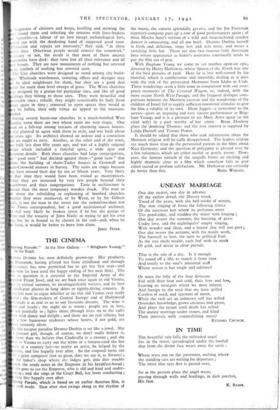THE CINEMA
pring Parade." At the New Gallery. " Brigham Young."
At the Regal.
ANNA DURBIN has now definitely grown-up. Her producer, Pasternak, having piloted her from childhood and through olescence, has now permitted her to get her first man—and :p him (at least until the happy ending of her next film).. The
o in question is a corporal in the Imperial Army of the peror Franz Josef, and we are back once again in old Vienna, n its eternal summer, its inextinguishable waltzes, and its host small-part players in long skirts or tightly-fitting trousers. It too late now to argue whether or no this old Vienna ever really fisted ; the film-makers of Central Europe and of Hollywood .e made it as real to us as our favourite dreams. The wine is cet and heady ; the night air is warm ; people are in love, t not painfully so ; lights shine through trees on to the cafés 'ay with dance and delight ; and there are no real villains, but ✓ a few humorous tricksters whose hearts, if not gold, are ost certainly silver.
n this escapist paradise Deanna Durbin is set like a jewel. She a peasant girl, though, of course, we don't really believe it, more than we believe that Cinderella is a tweeny ; and she es to Vienna to carry out the terms of a fortune-card she has girt at a country fair—to marry an artist, be helped by the peror, and live happily ever after. So the corporal turns out be a great composer (not so great, dare we say it, as Strauss) ; the baker's shop where she lodges gets into dire trouble ause she sends notes to the Emperor in his breakfast-bread ; she goes to see the Emperor, who is old and kind and under- ding ; and she sings at the Court Ball, her lover conducting ; they live happily ever after.
Pnng Parade, which is based on an earlier Austrian film, is i well made. Shot after shot swings along to the rhythm of
the music, the camera splendidly gyrates, and the Joe Pasternak repertory-company puts up a row of good performances again ; of these Mischa Auer's version of a wild and moustachioed czardos dancer is coruscating, and all too brief. Deanna Durbin herself is fresh and delicious, sings less and acts more, and wears a ravishing little hat. There are also two raucous little American boys whose appearance as baker's assistants continually tends to put the film out of gear.
With Brigham Young we come to yet another open-air epic, directed by Henry Hathaway, whose Spawn of the North was one of the best pictures of 1938. Here he is less well-served by his material, which is cumbersome and unwieldy, dealing as it does with the trek of the persecuted Mormons from Idaho to Utah. These wanderings seem a little tame in comparison with our ever- green memories of The Covered Wagon, or, indeed, with the more recent North West Passage; and the frequent dialogue com- parisons between the Mormbn caravan and the wanderings of the children of Israel fail to supply sufficient emotional stimulus to give the film a validity of its own. Dean Jagger—a newcomer to the screen—gives an imposing and very sincere performance as Brig- ham Young; and it is a pleasure to see Mary Astor again (as his chief wife) in a part worthy of her talent. Brian Donlevy plays the doubting Thomas; and the love interest is supplied by Linda Darnell and Tyrone Power.
It should be added that those who seek information about the Mormon religion will be sadly disappointed. The leaders seldom say much more than do the persecuted pastors in the films about Nazi Germany; and the question of polygamy is glossed over by a few references which are either tactful or gently jocose. How- ever, the famous miracle of the seagulls forms an exciting and highly dramatic close to a film which somehow fails to give either sacred or profane satisfaction. Mr. Hathaway can certainly






























 Previous page
Previous page